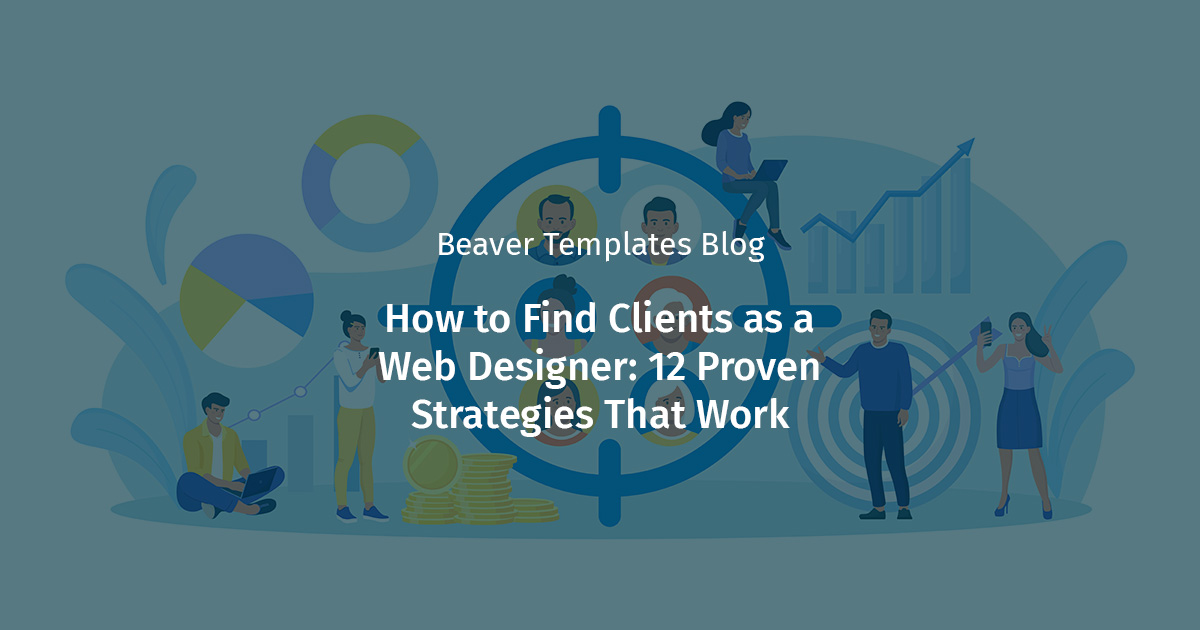Finding clients can be a major hurdle for web designers, especially when you’re starting out or trying to scale. Whether you’re a freelance web designer or run a full-fledged agency, knowing how to find clients consistently is key to building a thriving business.
In this post, we’ll share 12 proven strategies to help you find web design clients, ranging from quick wins to long-term growth tactics. And at the end, we’ll show you how to speed up your project delivery using professionally designed Beaver Builder templates from Beaver Templates.
How to Find Clients As a Web Designer
1. Specialize in a Niche
Generalists can get lost in a sea of competitors. One of the fastest ways to stand out and attract the right clients is by niching down. Focus on a specific industry (like real estate or wellness), platform (like WordPress), or service (like landing pages or eCommerce design).
When clients know exactly who you help and how, you’re easier to refer and trust.
2. Optimize Your Website for Local SEO
Clients often search for web designers near them. Optimize your website and Google Business Profile to appear in local searches. Include location-specific keywords like “web designer in Austin” in your page titles, meta descriptions, and service pages.
Also, make sure your site is mobile-friendly and fast. These are two key factors in local SEO performance. Moz’s guide to local SEO is a great resource to get started.
3. Use Portfolio Platforms
Don’t rely on your website alone to showcase your work. Upload select projects to platforms like Behance, Dribbble, and Clutch. These platforms attract business owners who are actively seeking design services.
Bonus: These profiles often rank well on Google, which can drive organic traffic to your work.
4. Build Strategic Partnerships
Partner with marketers, copywriters, branding consultants, and even other designers with different specialties. Offer referral agreements or collaborate on packages. Many clients need more than just a website; they need the full digital experience.
These relationships can become a consistent source of referrals over time.
5. Leverage LinkedIn the Right Way
LinkedIn is more than just an online resume. Treat it like a mini-portfolio and content platform. Share your process, before-and-after screenshots, and mini case studies. Comment on potential clients’ posts and start genuine conversations.
Tip: Optimize your headline to include your service and ideal client. For example, “Helping Wellness Coaches Grow with Strategic Web Design.”
6. Ask for Referrals
Don’t be shy about asking happy clients for referrals. A simple follow-up email saying, “If you know anyone else who needs help with their website, I’d love an introduction,” can go a long way.
You can also offer a small incentive like a discount on future work or a gift card to encourage word-of-mouth referrals.
7. Create Educational Content
You don’t need to be an influencer, but you do need to show your expertise. Start a blog, post tutorials, or create YouTube videos answering common questions (like “What’s the best website platform for lawyers?”).
This builds trust and boosts your search engine visibility. Plus, clients are more likely to hire someone who clearly knows what they’re doing.
8. Offer a Free Resource
Create a lead magnet like a “Website Launch Checklist” or “Top 5 Homepage Mistakes to Avoid” to collect email addresses. This helps create an email list, which you can use to stay top of mind and promote your services.
Make sure the resource is genuinely helpful and ties into your core offer.
9. Cold Outreach, But Personalize It
Cold outreach can work if it’s relevant and respectful. Research businesses with outdated or broken websites and send a short, value-focused message.
Instead of: “Do you need a new website?”
Try: “Hey Sarah, I noticed your website isn’t mobile-friendly, which may be hurting your search rankings. Would you be open to a quick chat? I specialize in website redesigns for boutique clothing brands.”
10. Use Freelance Platforms Strategically
Sites like Upwork, Fiverr Pro, and Toptal aren’t always a race to the bottom if you position yourself well. Highlight your niche, build up positive reviews, and set premium rates. These platforms can be a great source of short-term cash flow and even long-term clients.
Look for things like “Invite-Only” or “Expert-Vetted” programs on these platforms to avoid the lowest-bid trap.
11. Network in Person and Online
Yes, in-person networking still works! Attend local business events, chamber of commerce meetings, or niche trade shows. Bring business cards and prepare an elevator pitch.
You can also join communities online, like Facebook Groups, Discord servers, or Reddit threads related to your niche. Show up with value. Answer questions, provide feedback, and establish your reputation.
12. Showcase Social Proof
Don’t just say you’re good, show it. Add client testimonials, success metrics (like “increased conversion rate by 30%”), and case studies to your site and proposals.
Even a simple line like “trusted by 50+ small businesses” adds credibility and can tip the scales in your favor.
Build Websites Faster with Beaver Builder Templates
Once you figure out how to find clients and the work starts to roll in, you’ll want to deliver high-quality sites quickly, without burning out. That’s where Beaver Templates comes in.
Our professionally designed WordPress templates are built for Beaver Builder, and can be customized in minutes. Whether you’re creating landing pages, service pages, or full websites, you’ll save hours on design and development, giving you more time to focus on strategy and client relationships.
No more reinventing the wheel every time. Just plug in your client’s content, adjust the branding, and launch a polished website that gets results.
Explore our growing collection of conversion-focused templates here and give yourself a head start on your next project.
Ready to find clients and grow your web design business? Implement even a few of these strategies consistently, and you can start to build momentum that lasts.


